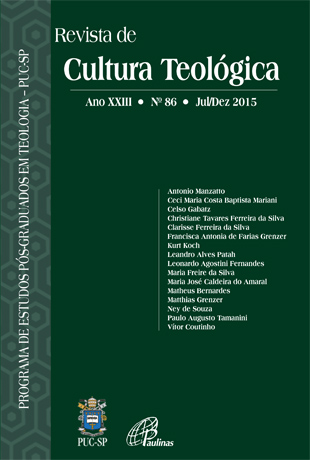Mysticism as critic in narratives by medieval women
DOI:
https://doi.org/10.19176/rct.v0i86.26041Keywords:
medieval Mysticism, critic, women, Marguerite Porete, Mechthild de MagdeburgAbstract
Mystics affirm God’s presence through the experience that they reachfrom negation. This process allows themto free from all attestations that pretend to frame God. Mystical texts will build themselves up through the narration of processes, paths along which it is much spoken about the human search for this absolutely transcendent God that surprisingly came, revealing itself much greater than what thoughts can think and what needs can need. This dialectics which is fundamentally critic – that will be demonstrated by the huge mysticism’s tradition that develops along the history of christianism – exposes the human condition and its impossibility to cover the unthinkable and “unavailable” mystery of God. It draws attention to the importance of humility, virtue that is perceived as nobility assurance. It makes one realize that, without recognition of the misery of the self, there is no possibility to reach God’s deep understanding. This criticism takes to a grand freedom and to a free disposition to love. Amongst the best testimonies of this mystical experience, there are the narratives by medieval women, passionate tellings on this critical process of asceticism to direct meeting with God. This study accomplishes a bibliographical and exploratory methodology on mysticism’s critic potentialities follwing the narratives by medieval women: Marguerite Porete and Mechthild of Magdeburg. These women took part on a spiritual group of the Beguines, a movement that developed as an alternative laic religious living in the Rhineland and the Netherlands. Marguerite Porete, mystic and medieval theologian, lived between the second half of the thirteenth century and the beginning of the fourteenth century. Preceding from the Hainaut county, Valenciennes city, Rhine region. The greatest legacy left by Marguerite Porete was a book, Le miroir de âmes simples e anéanties. Mechthild of Magedburg, german mystic, from the Low Saxon, born in 1210, enters the Beguines of Magdeburg in 1230. Since childhood she experienced divine revelations, and between the years 1250 and 1264, following her spiritual director’s guidance, she wrote her experiences on paper, a work that reaches our time with the title: Das fliebende Licht der Gottheit.Downloads
Issue
Section
Artigos





